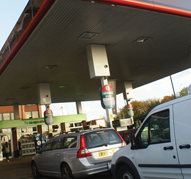A ‘binary’ argument is fuelling a stand-off between petrol forecourt retailers and the police, two sides that should be working to cut fuel crime, says Trevor Wallace, the managing director of Metro Security.
Wallace, whose software and hardware integration business provides technology for manned and unmanned forecourts, said: “This is a complex issue that requires a more considered discussion between the police and fuel industry – you can’t simply reduce it to a binary issue.”
He was responding to a police chief who has blamed petrol station owners for fuel thefts after it was revealed just two out of 255 incidents in his force area this year resulted in charges.
His comments came after a Freedom of Information (FoI) request by the Matlock Mercury newspaper found that thousands of fuel thefts from petrol stations in Derbyshire were going unpunished. The FoI request revealed that only 211 charges have been brought from 4,012 drive offs in the last ten years. Of the 255 fuel thefts from service stations in Derbyshire up until September 2018, only two charges had been brought.
Detective Chief Superintendent Mark Knibbs said: “The theft of fuel is a clear illustration of the dilemmas facing police forces in making decisions on where we place our limited resources. This type of crime is wholly preventable if stores adopted a pre-payment model for customers purchasing their fuel; something that’s been implemented successfully at many petrol stations in the county.
“As a force, we will continue to focus our resources on protecting vulnerable victims and on tackling the most serious criminality. However, on occasions where a criminal investigation is necessary and proportionate, then we can and will prosecute people in relation to the theft of fuel.”
Simon Cole, the National Police Chiefs’ Council (NPCC) lead on local policing said the industry could design out bilking in 30 seconds by making people pay up front, like they do in other countries. However, he said forecourts were reluctant to make the move “because the walk into their shops is part of their business offer”.
His comments were criticised by the trade body the Petrol Retailers Association (PRA), which said retro-fitting petrol pumps to take card payments at an average filling station would cost £20,000, with some industry experts putting the cost higher still.
“Instead of ‘victim blaming’ petrol retailers, the police should be honest that they are struggling to deliver their commitment to reduce crime,” said PRA chairman Brian Madderson.
Trevor Wallace, of Romford-based Metro Security, said: “We can provide solutions for manned and unmanned forecourts so we are agnostic on this argument. However, this is a much more nuanced issue that requires careful consideration and collaboration rather than simply attacking the other party’s position – there has been too much of that in recent political discourse.”
Wallace agreed with the PRA view that the Government could empower responsible businesses to enforce the law where the police are too overstretched to intervene.
“A solution that gives petrol retailers electronic access to the DVLA’s Vehicle Keeper database, so they can pursue drive-offs through the civil courts and ease pressure on the police could work as there is precedent in the retail sector where stores employ civil recovery proceedings for shoplifters in order to get the value of the items back.
“This could assist over-stretched forces but does not close the door on many mainly rural forecourts where trade through the store helps both the business and the community.”
The trade body BOSS (British Oil Security Syndicate) crime index for 2017 recorded its biggest ever rise in non-payment since the benchmark was launched in 2015 – rising from 97 to 104 points compared to the previous quarter where the trend had been consistently down over a two-year period.
“Conversely, we have seen a lot of interest in the pay at pump solutions where we monitor re-fuelling, and even talk to drivers 24/7, remotely,” said Wallace.
Drive-offs have risen from £26m to £31m a year in the last six years, according to the Petrol Retailers Association (PRA) and there is a persistent percentage of incidents where payment is never retrieved or offenders taken to task.










